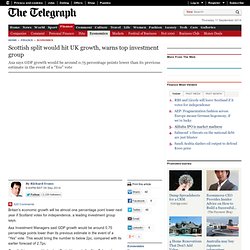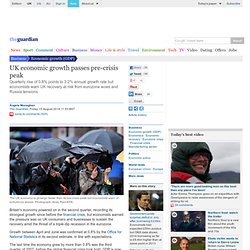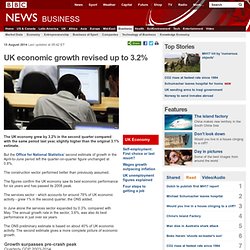

AS - Economic growth. Who Killed Economic Growth? Economy tracker: GDP. 28 January 2014Last updated at 10:41 ET Continue reading the main story Latest news: BBC's Declan Curry explains just what GDP stands for and why we should care The UK economy grew by 0.7% in the fourth quarter of 2013, down slightly from 0.8% in the third quarter of the year, according to the latest figures from the Office for National Statistics (ONS).
The figures mean that in 2013 the economy showed its strongest growth since 2007. The ONS data for construction was down 0.3% over the quarter, despite the recent recovery in a housing market. The services sector, which represents three-quarters of economic output, grew by 0.8%. After 1992, the UK economy and average household incomes enjoyed a period of unbroken growth. But in 2008, the global financial crisis plunged the UK into its longest and deepest recession since comparable records began in the 1950s. More than a million people lost their jobs as businesses - from shops to manufacturers and banks - either closed or laid off staff.
Scottish split would hit UK growth, warns top investment group. Such a large fall in growth would make interest rate rises less likely, have a “marked negative impact” on sterling and reduce gilt yields, Mr Page said.

This is likely to mean that mortgage rates would remain low but could mean further cuts in annuity rates for pensioners. Separately, the Governor of the Bank of England said on Tuesday that Scottish independence was “incompatible” with a formal currency union with the rest of Britain. Mark Carney said the experience of the eurozone showed that currency unions without fiscal union did not work. He said there were three components of a successful currency union – free movement of capital, labour, services and trade; a banking union with the same regulations and supervision on both sides; and a fiscal arrangement that would stabilise “inevitable fluctuations” between the economies. “We carried out these switches when we saw the gap closing to dangerously low levels,” Nick Hungerford, the founder and chief executive of Nutmeg, said. UK economic growth passes pre-crisis peak.
The UK economy is growign faster than its pre-crisis peak but economists warn of turbulence ahead.

Photograph: Andy Rain/EPA Britain's economy powered on in the second quarter, recording its strongest growth since before the financial crisis, but economists warned the pressure was on UK consumers and businesses to sustain the recovery amid the threat of a triple-dip recession in the eurozone. Growth between April and June was confirmed at 0.8% by the Office for National Statistics in its second estimate, in line with expectations.
The last time the economy grew by more than 0.8% was the third quarter of 2007, before the global financial crisis took hold. GDP is now 0.2% above its pre-recession peak in the first quarter of 2008. The annual growth rate was revised up from 3.1% to 3.2% – the strongest in more than six years. "The government's long-term economic plan is working, with the economy growing at its fastest annual rate in six years. UK economic growth revised up to 3.2% 15 August 2014Last updated at 05:42 ET The UK economy grew by 3.2% in the second quarter compared with the same period last year, slightly higher than the original 3.1% estimate.

But the Office for National Statistics' second estimate of growth in the April-to-June period left the quarter-on-quarter figure unchanged at 0.8%. The construction sector performed better than previously assumed. The figures confirm the UK economy saw its best economic performance for six years and has passed its 2008 peak. The services sector - which accounts for around 78% of UK economic activity - grew 1% in the second quarter, the ONS added. In June alone the services sector expanded by 0.3%. compared with May. The ONS preliminary estimate is based on about 40% of UK economic activity.
Output in production grew 0.3% in the quarter, but agriculture contracted 0.2%.